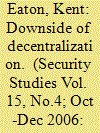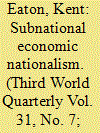| Srl | Item |
| 1 |
ID:
077224


|
|
|
|
|
| Publication |
2007.
|
| Summary/Abstract |
In the 1990s, Bolivia's indigenous population mobilized to claim new political roles, and in the process, directly challenged the privileged position of economic elites within national political institutions. In response, business associations in Santa Cruz, Bolivia's most prosperous region, began to demand regional autonomy-in contrast to the demand for authoritarianism that characterized prior generations of business elites when confronted with threatening political change. After examining Santa Cruz' past relationship with the national government, this article explores the challenges that led economic elites in the department to seek autonomy and the strategies that they have adopted in pursuit of this goal.
|
|
|
|
|
|
|
|
|
|
|
|
|
|
|
|
| 2 |
ID:
077739


|
|
|
|
|
| Publication |
2006.
|
| Summary/Abstract |
In recent years, decentralization and regional autonomy measures have figured prominently in negotiations designed to end some of the world's most important conflicts, including in Afghanistan, Iraq, and Sudan. Reforms that shift powers to subnational units deserve the attention of those who are trying to promote security via institutional design, but the risks associated with these territorial reforms are considerable. When political and economic resources are transferred to subnational governments in the attempt to create meaningful access to the political system for former combatants, the great risk is that these same resources can be used to finance a continuation of the armed struggle instead. In response to the popularity of territorial reforms in many post-conflict settings, this paper sounds a cautionary note by evaluating the negative impact of decentralization on security in Colombia, site of Latin America's longest and deadliest armed conflict. After analyzing the design decisions of reformers who hoped that decentralization would help end the conflict, I argue that decentralization in fact financed the expansion of armed clientelism by illegal groups on both the left and right. Thanks to the weakness of the police in much of the national territory, guerrillas and paramilitaries have been able to use decentralized resources to destabilize the state, limiting even further its monopoly over the use of force and creating what are in effect parallel states on the left and right
|
|
|
|
|
|
|
|
|
|
|
|
|
|
|
|
| 3 |
ID:
100330


|
|
|
|
|
| Publication |
2010.
|
| Summary/Abstract |
Across the third world, transnational corporations (TNCs) and subnational governments (SNGs) are coming into new forms of contact as a result of liberalization and decentralization. Despite scholarly expectations that subnational governments will respond by seeking out foreign direct investment, in much of Latin America these governments are confronting rather than courting transnational corporations. Conceptualizing this phenomenon as 'subnational economic nationalism', the article explores both how subnational governments are challenging neoliberalism and why these challenges often fail to subvert neoliberal outcomes. By examining two struggles against transnational capital that had different outcomes but that took place within a single subnational jurisdiction (Arequipa, Peru), the article argues that decentralization can work at cross purposes. While voters are increasingly demanding that elected subnational officials adopt nationalist positions vis-agrave-vis TNCs, these same officials often seek financial support from TNCs so that they can compete successfully in the subnational elections that have been introduced by political decentralization.
|
|
|
|
|
|
|
|
|
|
|
|
|
|
|
|